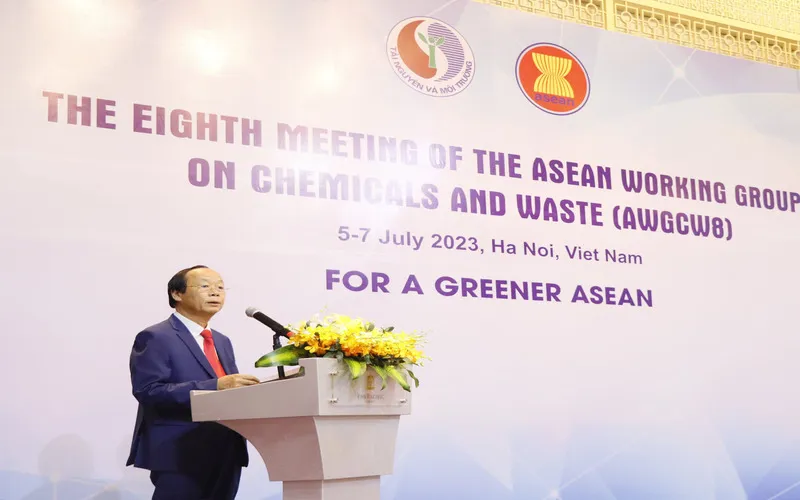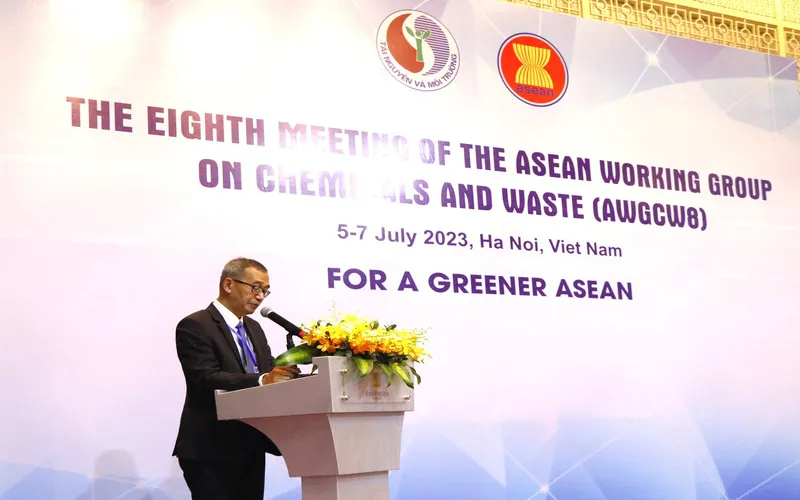Vietnam strengthens cross-border hazardous waste management cooperation
Vietnam will work closely with other ASEAN member countries, non-ASEAN countries and international partners to mobilize resources for capacity building, technology transfer and experience sharing on hazardous chemicals and waste management.
As a responsible and active member of ASEAN, Vietnam hopes to work with the international community and strengthen cooperation to prevent illegal cross-border transportation of chemicals and hazardous wastes following all international frameworks under multilateral environmental agreements.
Deputy Minister of Natural Resources and Environment Vo Tuan Nhan made the statement at the eighth meeting of the ASEAN Working Group on Chemicals and Waste (AWGCW-8) in Hanoi this week.
Deputy Minister of Natural Resources and Environment Vo Tuan Nhan speaks at the Conference. Photo: baotainguyenmoitruong.vn |
Nhan said the conference was held in the context that environmental pollution caused by chemicals and waste is becoming one of the serious threats to human health and the planet. "In particular, the ASEAN region is one of the hot spots of plastic pollution," he stressed.
"Vietnam will continue to implement environmentally sound management of hazardous chemicals and waste throughout their life cycle, reduce waste based on the principles of circular economy and following legal frameworks and national policies, and improve the legal framework for the management of persistent organic pollutants and waste," the Deputy Minister added.
He stressed that Vietnam would work closely with other ASEAN member countries, non-ASEAN countries, and international partners to mobilize resources for capacity building, technology transfer, and experience sharing on hazardous chemicals and waste management to contribute to building a greener ASEAN.
For his part, Achmad Gunawan Widjacsono, Director of the Solid Waste and Hazardous Materials Management Division of Indonesia's Ministry of Environment and Forestry, said chemicals and waste, including plastic waste, have become one of the most pressing global environmental issues. "Southeast Asia is no exception," he stressed.
Achmad Gunawan Widjacsono, Director of the Department of Solid Waste and Hazardous Substances Management under Indonesia’s Ministry of Environment and Forests, makes a speech at the conference. Photo: baotainguyenmoitruong.vn |
According to the World Bank, plastic accounts for 80% of all marine litter in the oceans. In six out of ten ASEAN member countries alone, more than 31 million tons of plastic waste is generated every year, Widjacsono said.
He noted that rapid economic development, urbanization and population growth lead to increased plastic consumption and production, resulting in growing plastic waste generation while recycling rates are low. There is also an increase in imports of plastic waste.
Improper post-use management of this waste has a significant negative impact on the environment and human health. Land-based plastic waste also ends up in the oceans, causing pollution and destroying coastal and marine ecosystems. This situation is further aggravated by the illegal cross-border movement of plastic waste contaminated with hazardous waste. This conference aims to promote ASEAN cooperation in addressing these challenges as soon as possible in the coming period, said Widjacsono.
Co-hosted by Vietnam's Ministry of Natural Resources and Environment (MoNRE) and the ASEAN Secretariat, the event is an opportunity for ASEAN members to review their cooperation on chemicals and waste management in recent years and to set directions and principles for regional cooperation in the coming period.
Established in late 2015, the AWGCW holds its annual meeting on a rotating basis among the ASEAN member states.












